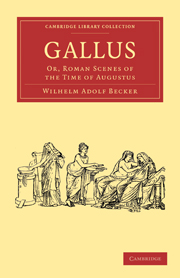Book contents
- Frontmatter
- Translator's Preface
- Author's Preface
- Contents
- ERRATUM
- SCENE THE FIRST THE NOCTURNAL RETURN HOME
- SCENE THE SECOND THE MORNING
- SCENE THE THIRD STUDIES AND LETTERS
- SCENE THE FOURTH THE JOURNEY
- SCENE THE FIFTH THE VILLA
- SCENE THE SIXTH LYCORIS
- SCENE THE SEVENTH A DAY AT BAIÆ
- SCENE THE EIGHTH THE DISPLEASURE OF AUGUSTUS
- SCENE THE NINTH THE BANQUET
- SCENE THE TENTH THE DRINKERS
- SCENE THE ELEVENTH THE CATASTROPHE
- SCENE THE TWELFTH THE GRAVE
- APPENDIX
- Excursus I Roman Marriage
- Excursus II Education
- Excursus I The Roman House
- Excursus II The Slave Family
- Excursus I The Library
- Excursus II The Books
- Excursus III The Booksellers
- Excursus IV The Letter
- Excursus V The Clocks and Divisions of Time
- Excursus I The Lectica and the Carriages
- Excursus II The Inns
- Excursus I The Game of Ball, and other Gymnastic Exercises
- Excursus II The Gardens
- Excursus: The Dress of the Women
- Excursus: The Baths
- Excursus: The Male Attire
- Excursus I The Meals
- Excursus II The Triclinium
- Excursus III The Table Utensils
- Excursus IV The Drinks
- Excursus I The Manner of Lighting
- Excursus II The Garlands
- Excursus III The Social Games
- Excursus: The Manner of Closing the Doors
- Excursus: The Interment of the Dead
- Index
Excursus IV - The Drinks
Published online by Cambridge University Press: 10 November 2010
- Frontmatter
- Translator's Preface
- Author's Preface
- Contents
- ERRATUM
- SCENE THE FIRST THE NOCTURNAL RETURN HOME
- SCENE THE SECOND THE MORNING
- SCENE THE THIRD STUDIES AND LETTERS
- SCENE THE FOURTH THE JOURNEY
- SCENE THE FIFTH THE VILLA
- SCENE THE SIXTH LYCORIS
- SCENE THE SEVENTH A DAY AT BAIÆ
- SCENE THE EIGHTH THE DISPLEASURE OF AUGUSTUS
- SCENE THE NINTH THE BANQUET
- SCENE THE TENTH THE DRINKERS
- SCENE THE ELEVENTH THE CATASTROPHE
- SCENE THE TWELFTH THE GRAVE
- APPENDIX
- Excursus I Roman Marriage
- Excursus II Education
- Excursus I The Roman House
- Excursus II The Slave Family
- Excursus I The Library
- Excursus II The Books
- Excursus III The Booksellers
- Excursus IV The Letter
- Excursus V The Clocks and Divisions of Time
- Excursus I The Lectica and the Carriages
- Excursus II The Inns
- Excursus I The Game of Ball, and other Gymnastic Exercises
- Excursus II The Gardens
- Excursus: The Dress of the Women
- Excursus: The Baths
- Excursus: The Male Attire
- Excursus I The Meals
- Excursus II The Triclinium
- Excursus III The Table Utensils
- Excursus IV The Drinks
- Excursus I The Manner of Lighting
- Excursus II The Garlands
- Excursus III The Social Games
- Excursus: The Manner of Closing the Doors
- Excursus: The Interment of the Dead
- Index
Summary
ALTHOUGH Roman authors name several drinks, prepared both from grain, as zythum; from wheat and barley, camum and cerevisia (ceria, celia); from fruits, as the quince, cydoneum; and from honey and water, as hydromeli, consequently a sort of mead; yet the Romans knew (besides the ἄριστονὕδωρ), wine only as a drink; and those potations resembling beer, cider, and mead, belonged only to different provinces, governed by Roman laws, and are therefore taken cognizance of among other things, under the head de vino legato. Ulp. Dig. xxxiii. 6, 9; Pliny, xxii. 25.
Wine was, however, no doubt, mixed with other things, to produce certain drinks, the way of preparing and taking which was, in general, quite different from ours.
The following are the most important of the numerous works on this subject, Pliny, xiv. 8, seqq.; Colum. xii., with Schneider's remarks, ii. 2; Virg. Georg. ii., with Voss' notes; Athen. i.; Poll. vi. 4; Galen, De Antidotis, i. 9; Dig. xxx. 6: and of modern authors, Bacci, de nat. vinorum hist.; Beckmann, Beitr., &c. i. 183; Boettiger, Ueber die Pflege d. Weins. b. d. alt. Röm.
Pliny's remark, Ac si quis diligenter cogitet, in nulla parte operosior vita est, ceu non saluberrimum potum aquœ liquorem natura dederit, can be applied to our own times, but the process among the ancients was much more tedious.
- Type
- Chapter
- Information
- GallusOr, Roman Scenes of the Time of Augustus, pp. 374 - 382Publisher: Cambridge University PressPrint publication year: 2010First published in: 1844



